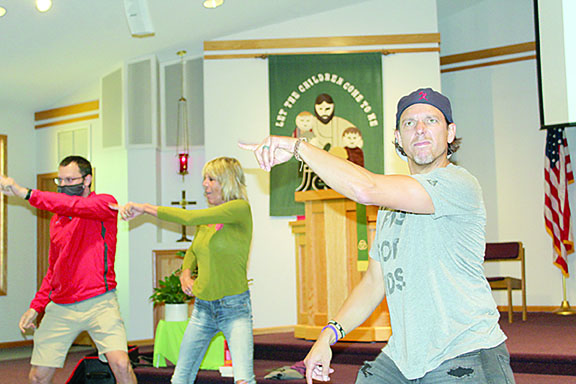
SO YOU THINK YOU CAN DANCE? - Speaker and consultant Joe Beckman encourages NRHEG staff to embrace their personal strengths by holding a dance contest to the tune of “YMCA.” Despite a determined effort, Cindi Bartness and Miles Otstot were outranked by Cortney Klocek and Dave Bunn. Star Eagle photo by Deb Bently
By DEB BENTLY
Staff Writer
Joe Beckman asked NRHEG staff members a simple question: “How far could you drive in seven-and-a-half hours?” He also pointed out that typical American 8- to 10-year-olds spend about that much time each day on electronic devices. By the age of 7, a child has often spent the equivalent of a full year on a screen.
Beckman, a nationally known consultant and presenter who works out of the Twin Cities, was the keynote speaker at the opening day workshop held for school staff on August 30. His 2-hour presentation featured thought-provoking questions, sobering facts, and some zany interaction, all with the point of emphasizing the value of human connection.
“Suicide rates among 10- to 12-year-olds began rising in 2007, and are at record levels,” he said. “How could this be?” Beckman postulated that the increasing numbers coincide with the introduction and rapid acceptance of the “smart” phone—along with its many effects on society. Not that the phones themselves are harmful, he explained, but that, rather than being used as the “tools” they are meant to be, they are being treated as “companions,” and are reducing the amount of genuine person-to-person interaction people experience.
“So many of the kids we interact with come from circumstances that are ‘broken’ in some way,” he said. “Sometimes the most valuable thing you can give them is a few seconds of genuine, human connection. Because ‘connection’ is the oxygen our souls breathe. It’s what we need to keep going.”
NRHEG Relationships-Education-Accountability-Character-Hard Work (REACH) teacher Robin Eder frequently uses materials featuring Beckman and his ideas to reinforce lessons featured in her classes. Eder says that Beckman’s personal energy, positive message, outgoing personality and local connection all help students to be receptive to his message. All of that was certainly the case on Monday.
Beckman admitted that he is “just one person with one set of ideas,” and that he could not hand NRHEG staff a “three-ring binder with all the answers,” but he advised educators to follow the instructions given prior to airline flights regarding oxygen masks. “You put your own on first, so you will have the strength and presence of mind to help others.”
He suggested that each person should appreciate his or her own character and abilities, find ways to overcome—and even find the positive side—of adversity, be willing to make mistakes, and appreciate the “magnificent” that often rests within the “mundane.”
Beckman mentioned that positive interaction causes the human brain to release the hormone oxytocin. “A funny thing about oxytocin,” he said. “Not only does it make you feel good, it makes the person you’re interacting with feel good.” And perhaps surprisingly, even a person watching the exchange from a distance can feel its effects.
“Make no mistake,” said Beckman, “You work with kids who need you—who need the positive, supporting, even crazy moments you can share with them. The ‘currency’ you have that can make the most impact is human connection.”
